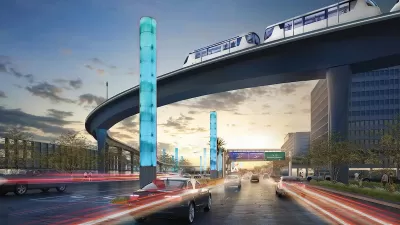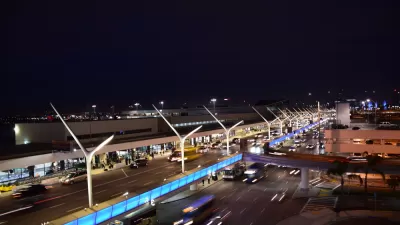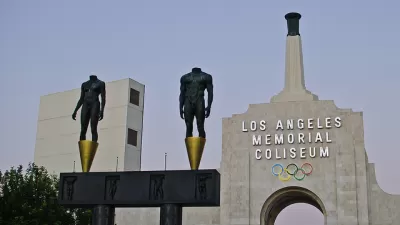Some of the reactions to the shooting at LAX revealed troubling attitudes towards public space. Inclined as we may be to tighten security, we ought not sacrifice the richness of public life in the name of safety -- even at an airport.
Last week the Huffington Post ran a concerning piece about the recent shooting at Los Angeles International Airport. In it, an attorney representing the Transportation Security Administration described his fear TSA personnel are "all sitting ducks." He, like many others, seems to be wondering whether they should be equipped to fire back.
You have to sympathize with anyone who works at an airport, especially in light of what happened last week. I do not wish to minimize the horror of the November 1 attacks. I am particularly horrified, and self-interested, because I fly out of LAX several times per month. But I don't think anyone should exaggerate the significance of Paul Ciancia's rampage for either public safety or the task of airport screening.
If merely being in an airport makes one a sitting duck, then so is every other American, in every other public place.
TSA screeners are not police. They are supposed to identify suspicious behavior and activities so that the real police can take action. In this effort, they protect the planes and their passengers. They are not trained or charged with protecting anyone or anything beyond that security wall.
And what is beyond that security wall? The entire world -- at least the entire world up to the Mexican and Canadian borders.
Airports are special, not because they are targets, but rather because they are gateways. Every Angeleno should cherish the economic contributions of LAX, and we should be proud that LAX cements our status as one of the world's truly great cities, connected in countless ways to far-off lands. Globalization happens at institutions like LAX, and the world, ideally, becomes a more friendly place because of it. At the same time, you have to wonder what an American city really is if we cannot get comfortable with, and in, public space.
The hysteria surrounding the LAX shooting has included calls to arm TSA agents and otherwise militarize airports; the shooting itself resulted in the closure of half the airport and the disruption of hundreds of flights long after it became apparent that Ciancia was not a terrorist as such. This response says as much about many Americans' attitudes towards public space as it does about their attitudes towards air travel. Too often, we fail to acknowledge that public life is messy, sometimes tragically so, but that freedom and comity can, and should, more than compensate for messiness.
The roadways, curbs, and ticketing areas of the world's eighth-busiest airport are no less public than are a mall, a sports stadium, a college campus, or the sidewalk in front of your house. Those are all places where people of good faith can congregate and enjoy each other's company -- so long as they trust each other. And yet, so many Americans go about their business silently, walking with heads down, driving with their windows up. We do not gain by encouraging "more," "tighter," or "heavier" security.
As recent history has proven time after tragic time, the savage combination of mental instability and readily available firearms can unleash itself anywhere. It can happen in offices, malls, and movie theaters, not to mention military bases, university campuses, and elementary schools. The fact that one of these incidents -- perpetrated not by a terrorist or hijacker but by one of America's garden-variety assassins -- can also happen at a airport is almost beside the point.
It's no exaggeration to say that the average TSA agent faces more danger on the drive to work each day than he faces in his entire career at the airport. Naturally, some of that danger, however faint it may be, comes from enemies. They are real and they are nefarious. We have responded to them with both sensible measures and stentorian bombast. Meanwhile, we greet with relative silence some of the true tragedies of our age: the drug war, the education crisis, suburban discontent, and the 39,000 traffic fatalities annually, all of which dwarf anything that transpired at LAX.
In an American street, we cannot shake our fists at anyone in a turban or a throbe, whether they deserve it or not (most likely not). Instead, all too often, in almost every corner of America, the enemy is us. We sell each other junk food, we crash our cars into each other, and, on occasion, we shoot our own neighbors. Even under normal circumstances, we rush past each other, unblinking, en route from the Walmart door to our car across the tarmac.
The LAX shooting has led to calls for "security," as if the record of the past 10 years isn't something of which the TSA and all Americans should be proud.
But what about comity? What about freedom? What about trust? What about recognizing that all Americans should feel equally safe -- and equally confident -- in all public spaces. We should not have to insist that the airport be safe while, otherwise, we hole up in lonely suburban houses trembling, out of fear or bloodthirst, at the prospect that a bad guy might one day come knocking.
Of course, some parts of America are doing well. Certain parts of certain cities are becoming more walkable, pleasant, and, hopefully, more safe. They are becoming more like the types of places that inspire Americans to get on a plane in the first place (for a dream vacation to Europe, for example).
In considering the nature of American public spaces, it's impossible to avoid Jane Jacobs, who said it best, long before the advent of X-ray machines, porno scanners, and Al Quaeda. Security does not lie in the police, the military, or the TSA. And it certainly does not lie in guns. While we need law enforcement and the military -- when they are well trained and when they execute their jobs -- true safety, of the sort that prevails in the best of our cities and neighborhoods, lies in something else.
It lies in trust, good faith, and "eyes on the street." Or, in some cases, eyes in the terminal.
A version of this piece appeared in the California Planning & Development Report, of which Josh Stephens is editor emeritus.

Alabama: Trump Terminates Settlements for Black Communities Harmed By Raw Sewage
Trump deemed the landmark civil rights agreement “illegal DEI and environmental justice policy.”

Planetizen Federal Action Tracker
A weekly monitor of how Trump’s orders and actions are impacting planners and planning in America.

The 120 Year Old Tiny Home Villages That Sheltered San Francisco’s Earthquake Refugees
More than a century ago, San Francisco mobilized to house thousands of residents displaced by the 1906 earthquake. Could their strategy offer a model for the present?

In Both Crashes and Crime, Public Transportation is Far Safer than Driving
Contrary to popular assumptions, public transportation has far lower crash and crime rates than automobile travel. For safer communities, improve and encourage transit travel.

Report: Zoning Reforms Should Complement Nashville’s Ambitious Transit Plan
Without reform, restrictive zoning codes will limit the impact of the city’s planned transit expansion and could exclude some of the residents who depend on transit the most.

Judge Orders Release of Frozen IRA, IIJA Funding
The decision is a victory for environmental groups who charged that freezing funds for critical infrastructure and disaster response programs caused “real and irreparable harm” to communities.
Urban Design for Planners 1: Software Tools
This six-course series explores essential urban design concepts using open source software and equips planners with the tools they need to participate fully in the urban design process.
Planning for Universal Design
Learn the tools for implementing Universal Design in planning regulations.
Clanton & Associates, Inc.
Jessamine County Fiscal Court
Institute for Housing and Urban Development Studies (IHS)
City of Grandview
Harvard GSD Executive Education
Toledo-Lucas County Plan Commissions
Salt Lake City
NYU Wagner Graduate School of Public Service






























